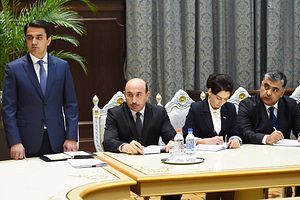Nepotism never went out of style in Central Asia. Analysts with spiderweb charts of familial connections among the well-heeled and powerful will need to update the title of the eldest son of Tajikistan’s president. The son of Emomali Rahmon, 29-year-old Rustam Emomali, was appointed mayor of Dushanbe by his father’s decree.
The longtime mayor of Dushanbe, Mahmadsaid Ubaydulloyev, was dismissed after holding the cushy post since the late 1990s. In 2000 he was appointed chairman of the National Assembly, the upper chambers of Tajikistan’s then-new bicameral parliament. Though the 64-year-old Ubaydulloyev has lost the mayor gig, it appears Ubaydulloyev will remain chairman of the rubberstamp parliamentary body.
Tajik media reports peg Ubaydulloyev as the “second person in the state.” Acute regional observers would point out that in other Central Asian states — Uzbekistan, most recently, but also Turkmenistan — the prescribed succession which puts the head of the national assembly as second-in-line after the president is a bit of a sham.
Rustam, the president’s oldest son, has long been floated as a potential successor to his father. That theory was bolstered by a constitutional referendum last May which, among 40 other amendments, lowered the age requirement for the presidency from 35 to 30. The next time Tajikistan is due for a presidential election — 2020 — Rustam will be 32 (unless the election is after December 19 — Rustam’s birthday — in which case he’d be 33).
Whether that theory has weight or not is a difficult call. Another of the May 2016 amendments was the removal of term limits specifically for Emomali, the “leader of the nation,” allowing him to run indefinitely in elections he’s guaranteed to win. In other Central Asian states — Uzbekistan most prominently but Kazakhstan, also — theories swirled for years about familial succession but have come to naught (so far.)
But, as EurasiaNet points out, should Ubaydulloyev decide to quit his chairmanship “‘of his own will’ as well, Emomali may claim the post, in effect making him the formal successor to his father.”
It isn’t, however, difficult to see that the Tajik president’s children have enjoyed great success thanks to their father’s position.
Rustam is a prime, and colorful, example, but the family tree contains many in prominent positions. Ozoda Rahmonova, 38 years old and the president’s second daughter, served as a deputy foreign minister until her appointment, in January 2016, as her father’s chief of staff. Rukhshona Rahmonova, cited by RFE/RL as the president’s third daughter (but referred to as his fifth daughter in this graphic), became head of the Foreign Ministry’s international relations department in November 2016. Reporting on her appearance on a government website’s staff list motivated the government to temporarily revoke the credentials of a handful of Tajik RFE/RL journalists.
In March 2015, at the age of 27, Rustam was appointed head of Tajikistan’s anti-corruption agency. I remarked last year that “[n]epotism doesn’t seem to be the brand of corruption Tajikistan’s anti-corruption agency is looking for.”
It’s unclear how good a job Rustam did leading the anti-corruption agency. Corruption remains a major problem in the country (and that’s putting it lightly). Transparency International ranked Tajikistan at 136th out of 168 countries in its 2015 Corruption Perception Index. The index will get an update in the coming weeks but no one should expect a tremendous change in Tajikistan’s position. While Tajikistan has risen in World Bank’s Ease of Doing Business ranking, it still brings up the rear in the Europe and Central Asia region.
Prior to his stint at the anti-corruption agency, at various points in time Rustam held a seat on the Dushanbe city council, headed Tajikistan’s football federation, owned a football club, and had a job with the Customs Service fighting smuggling, which led to his heading that same agency in 2013. Most of these positions came by the decree of his father, who has near complete control of the country he’s led since 1992.

































